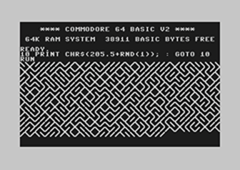
10print running on a Commodore 64
We typically think of computer programming as a technical skill, one that involves the disciplines of math and science, and we often consider software to be a tool, something that helps us complete tasks efficiently. However, software can be more than a tool, and many writers and scholars in the humanities write code. We can use computer programming to create literature and to explore new ways of expressing ideas. In this class, we'll examine computer programming as a writing practice, as a way to express ideas and make arguments. From video games to digital storytelling to electronic poetry, software can be used to create worlds and to play with language.
This course is part of a Freshman Interest Group (FIG), and students also enroll in two other courses: "Introduction to Composition" and "Introduction to Computation." This FIG does not require that students know anything about programming a computer or about digital games. The class offers multiple opportunities to tinker with various technologies and to try out new writing practices. The only requirement is curiosity. In this class, we will ask: What happens when we explore the relationships between writing and coding? What do these practices have in common, and how are they different?
